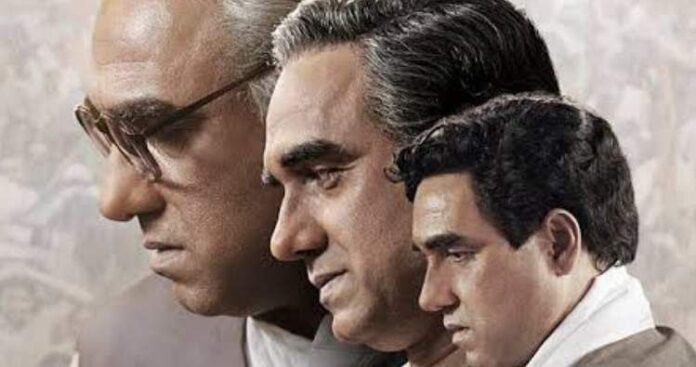Probably the only “cinematic” moment in Main Atal Hoon is when LK Advani (Raja Rameshkumar Sevak) urges Atal Bihari Vajpayee (Pankaj Tripathi) to accompany him to the theatre. The film is Rajendra Kumar and Vyjanthimala’s 1968 release Saathi. A phone rings. Deendayal Upadhyaya, the leader of the Bhartiya Jan Sangh, was found dead beside a train track under “mysterious circumstances.” Now, this prompts an immediate question. Why Saathi? Turns out, in the film, Vyjanthimala’s Shanti dies in a train accident. This might be a desperate parallel coming from a critic, eager to spot film references. But make no mistake, Main Atal Hoon is pure propaganda, with no space for cinema or cinematics.
Directed by: Rai Jadhav
Starring: Pankaj Tripathi, Piyush Mishra, Raja Rameshkumar Sevak, Daya Shankar Pandey
The film proceeds like a power-point presentation, each event in the former PM’s life merely a bullet point. RSS, Jana Sangh, Emergency, Pokhran test, Kargil War, we flip through chapters of Atal Bihari Vajpayee’s life, not engaging with any, lest we try to read between the lines. When we meet him for the first time, he is being briefed on the Kargil War. Back towards the camera, he is facing a blinding white light. A foreshadowing of the deification that is to come. When Vajpayee stands at the door of the Lok Sabha, elected for the first time, it is shot like God has apparated from an idol in a temple. At times, the background score is so prostrate, it reminded me of Jai Santoshi Maa (1975).
The BGM is how Main Atal Hoon tries to get under your skin. It mostly rouses to invoke sentiments of nationalism and desh seva. Sometimes it tries to be comic, like in scenes featuring Vajpayee’s father (played by Piyush Mishra). At all times it is deafening, trying to drill its message into the audience’s ears. It is not demanding but commanding emotions from the viewer. It almost felt like an assault on the rational voice inside your head.
The nuances of life die down under all this loudness. Contrary to what the title suggests, Main Atal Hoon is the biopic of a party, not of a person. We never get deep into the mind of a man who was quite Gandhian in a right-wing outfit. Vajpayee is shown as a committed RSS man but there is no mention of how sometimes his viewpoints were contrarian to that of the Sangh. We are informed about his love for sweets but not for meat and alcohol. The film feels like a careful pruning of a life story, being done to fit it into an agenda. Only two images linger in your mind long after watching the film, one of the ‘Om’ symbol and the other of the lotus.
Pankaj Tripathi is sincere in his portrayal of the late PM. He emulates the gestures and the sing-song voice of Vajpayee but because of the bland screenplay, he is unable to imbibe the soul of the role. Tripathi sways too much in poetic bliss after every dialogue, as if he is remembering a Ghazal. It is more caricature than character.
What Main Atal Hoon lacks the most is riveting drama. After a point, it becomes a showreel of the greatest hits from Vajpayee’s life. There are no conflicts, except in the form of Indira Gandhi discussing cold maneuverings over hot cups of chai. We return to the cinema, literally, in a scene where Vajpayee and Advani are sitting in a theatre. “And, why do you like the movies?” Advani asks Vajpayee. “The happiness we are seeking in our lives, cinema shows that,” he says. “What we see on screen, we believe.”
#Pankaj #Tripathi #sincere #Atal #Bihari #Vajpayees #hagiography #Cinema #express

